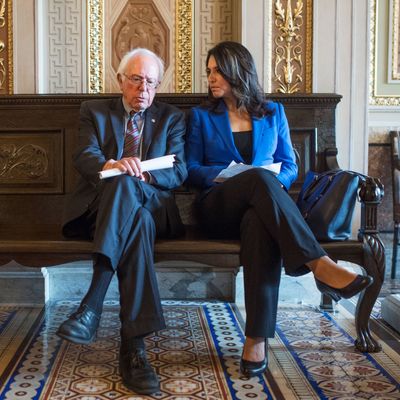
The early state polling drought in the 2020 Democratic presidential contest really does seem to be ending. After this weekend’s gold-standard Selzer poll from Iowa, today we received results from high-quality polls in New Hampshire (Monmouth) and Nevada (USA Today/Suffolk).
The most immediate news in this mini-harvest of public opinion is that the Monmouth poll qualified a 12th candidate for the October Democratic debates in Ohio by taking 2 percent, Tulsi Gabbard now has met the four-poll 2 percent threshold. This development all but eliminates any doubts that this round of debates will again be a two-day affair, after the brief bliss of ten candidates fitting on the same stage in Houston earlier this month.
The same poll, though, continues a string of bad results for Bernie Sanders in terms of his standing in early states vis-à-vis his progressive rival Elizabeth Warren. Monmouth has Warren now edging Joe Biden in the Granite State by a 27-25 margin — but with Sanders down to 12 percent, just ahead of Pete Buttigieg with 10 percent. This is extremely similar to what Selzer found in Iowa (Warren 22 percent, Biden 20 percent, Sanders 11 percent, Buttigieg 9 percent). That makes any suspicion (based on an national poll in August showing Warren in a three-way tie with Biden and Sanders) that Monmouth is somehow putting a thumb on the scales for Warren a non-starter. The USA Today/Suffolk poll of Nevada shows Biden still in the lead with 23 percent, but Sanders at 14 percent is trailing Warren’s 19 percent by a significant margin. Indeed, as Nate Silver pointed out (a bit too avidly, you might say, but accurately), poor early state poll numbers for Sanders are becoming too routine for comfort:
As a reminder, Sanders won nearly half the vote in Iowa and Nevada in 2016, along with 60 percent of the vote in New Hampshire.
Like his fellow late-septuagenarian Joe Biden, Sanders is doing quite a bit better in national polls. The latest RealClearPolitics averages have Biden at 30 percent, Warren at 20 percent, and Sanders at 17 percent, with Buttigieg way back at 6 percent. But the trends aren’t great for Bernie. For months one of his bulwarks was the vast Morning Consult tracking poll. He’s now fallen behind Warren there, too.
Aside from the good news for Gabbard concerning the October debates, we are now in the window when selected polls will count toward qualification for the November debate, too. With today’s releases, there are now two national qualifying polls and three from the early states, with the threshold now up to a three percent showing in four national and/or early state polls, or 5 percent from two early state polls. The Big Three plus Buttigieg and Harris are hitting these thresholds routinely, but among the iffier candidates, it’s notable that Booker and Yang now have two qualifying polls, while Klobuchar, O’Rourke, and Steyer have just one (September debate participant Julian Castro has been skunked so far, as has Gabbard, whose qualifying number from Monmouth for October fell short of the November threshold).
We’re probably looking at a single night of debates in November, but the thing to watch is whether the current Big Three of Biden, Warren, and Sanders is looking more like a Big Two with Bernie slipping back and perhaps some other candidate coming on.






























